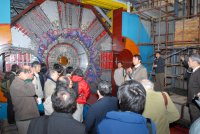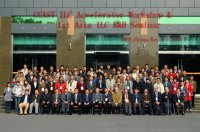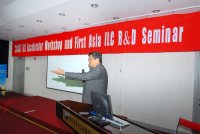 |
 |
|||||||||||||
|
|||||||||||||
|
|||||||||||||
|
New expressways and subways are under construction. New hotels and apartment buildings are popping up. This city with a population of over 15 million people, which is already big enough, is getting ready for the coming year of increasing visitors who will attend the Olympic Games. This is Beijing. From 5 to 7 November, the CCAST (the China Center of Advanced Science and Technology) accelerator workshop and the First Asian ILC R&D workshop took place in this booming city of Beijing, China at the Institute of High Energy Physics. During his remarks at the “ILC Accelerator Workshop and the First Asian ILC R&D Seminar,” Chuang Zhang, the senior scientist at the accelerator centre of IHEP and chairman of the Asian Committee for Future Accelerators (ACFA), quoted the slogan of the Beijing Olympic games: One World, One Dream. “This slogan that you now see all over the city can be used for our project too,” he said. About 120 attendants from nine countries discussed and shared information regarding ILC related R&D during the meeting. Jie Gao, the leading scientist for ILC collaboration at IHEP said, “The International Linear Collider will be the International Space Station on the ground. The ILC is a great opportunity for Chinese scientists.” More than 10 younger researchers include graduate students and post docs participated in the workshop, gaining valuable information from the discussions. Gao stressed the importance of this younger generation's participation in the conference. “I think one of the most important points I should mention about this meeting is the participation of young researchers,” said Gao. “They will be the main researchers when ILC construction finishes and commissioning starts.” The CCAST workshop also played an important role in strengthening the close relationships between Asian countries. Even though the name of the meeting describes it as the 'First' Asian ILC R&D seminar, this is not a whole new framework. Nobuhiro Terunuma, an accelerator scientist at KEK, provided some background during his talk at the conference. “We have had Asian R&D seminars eight times since 2000. The theme of these seminars was concentrated on beam physics so far. Starting at this meeting, we are going to cover all aspects of ILC R&D,” he said. Those past seminars were held under the framework of the Core University Program, which enables them to build a good network for ILC Asian Collaboration. At the CCAST workshop, participating scientists divided into two groups, one for the accelerator and the other for detectors. The allotted time for each speaker needed to be shortened from 30 minutes to 20 minute due to the breadth of topics that needed to be covered. The members of the Asian Committee for Future Accelerators also met during the workshop. ACFA reconfirmed their commitment for realising the ILC. To strengthen the Asian collaboration, ACFA welcomed the proposal to establish an ILC Asian office. This new office will facilitate communication and people-to-people exchange in the Asian ILC community. The timeline and details for creating such an office will be discussed further, taking one step forward to realise 'One World, One Dream.' -- Rika Takahashi |
|||||||||||||
| © International Linear Collider |


